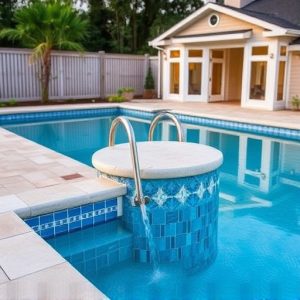Inground Pool Safety: Maximizing Protection with Swimming Pool Alarms
Swimming pool alarms are essential safety devices for inground pools, providing an extra layer of p…….
Swimming pool alarms are essential safety devices for inground pools, providing an extra layer of protection against unauthorized or accidental access. These alarms detect motion on the water's surface and emit a loud audible signal to alert owners immediately, crucial for rapid response and minimizing potential dangers like submersion or entrapment incidents. When selecting an alarm, it's important to consider pool size, depth, and environmental factors to ensure the alarm is effective and requires minimal upkeep. Surface wave alarms are particularly suitable as they can cover large areas without obstruction. Installing these alarms in accordance with local regulations, combined with other safety measures like fencing, creates a comprehensive safety framework for inground pools. Inground pools serve as family recreation spots, but the risk of drowning, especially with young children, necessitates stringent safety precautions. Swimming pool alarms for inground pools are recommended to be integrated with home security systems or offer remote monitoring features for even greater safety. These alarms, whether passive or active, are integral to maintaining a secure swimming environment and complement physical barriers and supervision. It's important to evaluate the alarm's ease of installation, integration with existing safety measures, and performance across various weather conditions to ensure optimal protection. By carefully selecting a system that meets these criteria, homeowners can significantly enhance the security of their inground pool areas, safeguarding the well-being of children and pets.
When it comes to safeguarding your inground pool, prioritizing protection is paramount. This article delves into the essential aspects of enhancing safety with swimming pool alarms specifically designed for inground pools. We’ll explore the critical role these alarms play in families with young children, ensuring a secure environment. Further, we will navigate through the myriad of pool alarm types available, highlighting their suitability and installation considerations tailored to inground pools. Additionally, we will guide you on selecting the optimal swimming pool alarm for your unique setup, considering both wired and wireless options. Advanced technology and user-friendly features are key focal points in this discussion, alongside maintaining compliance with local regulations. Ultimately, our aim is to equip you with the knowledge to maximize protection and peace of mind around your inground pool.
Enhancing Safety with Swimming Pool Alarms for Inground Pools
Swimming pool alarms play a pivotal role in bolstering the safety measures of inground pools. These sophisticated devices are designed to detect any unauthorized or accidental entries into the pool, offering an additional layer of protection for swimmers, especially children and pets. When integrated with inground pools, these alarms can promptly alert pool owners or caretakers with a loud audible signal upon sensing motion in the water, ensuring immediate response. This swift notification capability is crucial as it minimizes the risk of prolonged exposure to potential dangers, such as submersion or entrapment.
Selecting the right swimming pool alarm for an inground pool involves considering factors like the pool’s size, depth, and the layout of the surrounding area. Surface wave alarms are particularly effective for inground pools, as they can cover large surfaces without being hindered by obstacles that might affect other types of sensors. Additionally, these alarms are user-friendly and require minimal maintenance to function optimally. It’s advisable to install such alarms in compliance with local safety regulations and to complement them with other safety features, like pool fencing and barriers, to create a comprehensive safety system for inground pools.
– Importance of Pool Safety for Families with Young Children
Inground pools offer a delightful respite from the heat and a source of enjoyment for families. However, with young children in the home, safety becomes paramount. The importance of pool safety cannot be overstated, as drowning remains a leading cause of unintentional injury death for children under the age of five. To mitigate these risks, investing in reliable swimming pool alarms for inground pools is a critical step. These alarms are designed to detect unauthorized access and alert homeowners immediately, providing precious time to respond and prevent tragedy. It’s crucial to choose alarms that integrate with your existing security system or offer remote monitoring capabilities, ensuring peace of mind even when you’re not within earshot of the pool. Additionally, these devices can be set up to trigger audible or visual alerts, which are particularly useful in environments where silence might otherwise signal an emergency. By prioritizing the installation of swimming pool alarms for ingground pools, families can safeguard their children and enjoy their pool with greater confidence in the protection measures in place. Regular maintenance and vigilance also play significant roles in maintaining a safe pool environment; however, the strategic placement and use of these alarms are among the most effective ways to ensure that safety protocols are observed consistently.
– Types of Pool Alarms and Their Suitability for Inground Pools
When it comes to ensuring the safety of inground pools, investing in reliable swimming pool alarms for inground pools is paramount. These alarms serve as a critical line of defense against unauthorized access and potential drowning incidents. There are two main types of pool alarms suitable for inground pools: passive and active. Passive alarms, such as motion detectors, sound an alarm when they sense movement around the perimeter of the pool, effectively alerting homeowners to unexpected activity. These are highly effective when installed in conjunction with a well-designed pool fence or barrier system. On the other hand, active alarms require a user to actively set and deactivate them; they can be programmed to detect when someone enters the water, triggering an alarm that is audible both at the poolside and remotely. Both types of swimming pool alarms for inground pools are designed to complement each other, offering comprehensive coverage and peace of mind. Homeowners should consider the specific needs and layout of their inground pool when selecting the appropriate alarm system, ensuring that it integrates seamlessly with their pool’s environment and security measures. Additionally, when choosing an alarm, factors such as ease of installation, compatibility with existing safety features, and reliability in various weather conditions are important to evaluate. By investing in the right swimming pool alarms for inground pools, homeowners can significantly enhance the safety of their pool area, providing protection for both children and pets.


